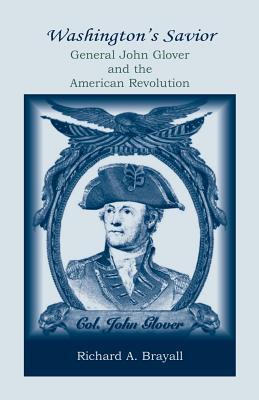Even today, he still stands guard over Boston, watching all who approach the "cradle of the Revolution" by way of Huntingdon Avenue. His visage remains as strong and determined in bronze as it was in real-life flesh and blood. John Glover has been at this post since 1828, when a grateful Commonwealth of Massachusetts erected this statue to honor the general from Marblehead and his men who time and time again saved the American Revolution from total and final defeat. A true son of Massachusetts, John Glover impressed George Washington at first sight, and the General continued to call on him for special service throughout the war. Glover developed the first American navy early in the conflict, and his ship Hannah was the first armed vessel to fly American colors. Glover and his men saved Washington, the entire army and the Revolution itself at the battles of Brooklyn and Pell's Point on Long Island. Then, on a cold and wintry night in December of 1776, the "web-footed warriors" from Marblehead rowed the army across the ice-choked Delaware River to Trenton where Washington won his most famous and his most needed victory. This book, based on letters, diaries, memoirs and contemporary papers, makes note that Glover was many things to many people and also had his set of demons to fight. And it shows that John Glover was, as the statue noted, at his best as "a soldier of the Revolution." Several photographs and an index to full-names, places and subjects add to the value of this work.

Washington's Savior: General John Glover and the American Revolution
Even today, he still stands guard over Boston, watching all who approach the "cradle of the Revolution" by way of Huntingdon Avenue. His visage remains as strong and determined in bronze as it was in real-life flesh and blood. John Glover has been at this post since 1828, when a grateful Commonwealth of Massachusetts erected this statue to honor the general from Marblehead and his men who time and time again saved the American Revolution from total and final defeat. A true son of Massachusetts, John Glover impressed George Washington at first sight, and the General continued to call on him for special service throughout the war. Glover developed the first American navy early in the conflict, and his ship Hannah was the first armed vessel to fly American colors. Glover and his men saved Washington, the entire army and the Revolution itself at the battles of Brooklyn and Pell's Point on Long Island. Then, on a cold and wintry night in December of 1776, the "web-footed warriors" from Marblehead rowed the army across the ice-choked Delaware River to Trenton where Washington won his most famous and his most needed victory. This book, based on letters, diaries, memoirs and contemporary papers, makes note that Glover was many things to many people and also had his set of demons to fight. And it shows that John Glover was, as the statue noted, at his best as "a soldier of the Revolution." Several photographs and an index to full-names, places and subjects add to the value of this work.